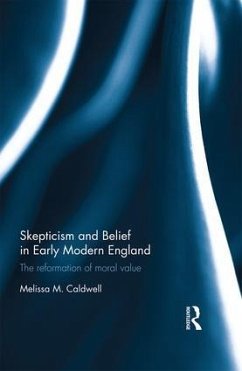- Gebundenes Buch
- Merkliste
- Auf die Merkliste
- Bewerten Bewerten
- Teilen
- Produkt teilen
- Produkterinnerung
- Produkterinnerung
Analyzing a variety of literature-including religious polemic, dialogue, pamphlets, sermons, and treatises-Melissa Caldwell argues that a skeptical mode of thinking is embedded in the literary and rhetorical choices made by English writers who straddle the project of reform and the maintenance of orthodoxy after the Reformation in England. Far from being a radical belief simply indicative of an emerging secularism, she demonstrates that skepticism was instrumental to the defense of orthodox religion.
Andere Kunden interessierten sich auch für
![British Women and the Intellectual World in the Long Eighteenth Century British Women and the Intellectual World in the Long Eighteenth Century]() Teresa BarnardBritish Women and the Intellectual World in the Long Eighteenth Century202,99 €
Teresa BarnardBritish Women and the Intellectual World in the Long Eighteenth Century202,99 €![Female Transgression in Early Modern Britain Female Transgression in Early Modern Britain]() Richard HillmanFemale Transgression in Early Modern Britain202,99 €
Richard HillmanFemale Transgression in Early Modern Britain202,99 €![Spenser and the Discourses of Reformation England Spenser and the Discourses of Reformation England]() Richard MalletteSpenser and the Discourses of Reformation England61,99 €
Richard MalletteSpenser and the Discourses of Reformation England61,99 €![Writing Conscience and the Nation in Revolutionary England Writing Conscience and the Nation in Revolutionary England]() Giuseppina Iacona LoboWriting Conscience and the Nation in Revolutionary England106,99 €
Giuseppina Iacona LoboWriting Conscience and the Nation in Revolutionary England106,99 €![The Puritan Experience The Puritan Experience]() Owen C WatkinsThe Puritan Experience159,99 €
Owen C WatkinsThe Puritan Experience159,99 €![The Rivalrous Renaissance The Rivalrous Renaissance]() Bradley J IrishThe Rivalrous Renaissance206,99 €
Bradley J IrishThe Rivalrous Renaissance206,99 €![Finding the Right Words Finding the Right Words]() Claudia Di SciaccaFinding the Right Words103,99 €
Claudia Di SciaccaFinding the Right Words103,99 €-
-
-
Analyzing a variety of literature-including religious polemic, dialogue, pamphlets, sermons, and treatises-Melissa Caldwell argues that a skeptical mode of thinking is embedded in the literary and rhetorical choices made by English writers who straddle the project of reform and the maintenance of orthodoxy after the Reformation in England. Far from being a radical belief simply indicative of an emerging secularism, she demonstrates that skepticism was instrumental to the defense of orthodox religion.
Hinweis: Dieser Artikel kann nur an eine deutsche Lieferadresse ausgeliefert werden.
Hinweis: Dieser Artikel kann nur an eine deutsche Lieferadresse ausgeliefert werden.
Produktdetails
- Produktdetails
- Verlag: Taylor & Francis
- Seitenzahl: 250
- Erscheinungstermin: 19. September 2016
- Englisch
- Abmessung: 231mm x 152mm x 20mm
- Gewicht: 476g
- ISBN-13: 9781472444646
- ISBN-10: 1472444647
- Artikelnr.: 47827260
- Herstellerkennzeichnung
- Libri GmbH
- Europaallee 1
- 36244 Bad Hersfeld
- gpsr@libri.de
- Verlag: Taylor & Francis
- Seitenzahl: 250
- Erscheinungstermin: 19. September 2016
- Englisch
- Abmessung: 231mm x 152mm x 20mm
- Gewicht: 476g
- ISBN-13: 9781472444646
- ISBN-10: 1472444647
- Artikelnr.: 47827260
- Herstellerkennzeichnung
- Libri GmbH
- Europaallee 1
- 36244 Bad Hersfeld
- gpsr@libri.de
Melissa M. Caldwell is Associate Professor of English and Director of Undergraduate Studies at Eastern Illinois University, USA.
Table of Contents
Introduction: Skepticism, Belief, and the English Church
I. The Value of Uncertainty in Reformation England
II. The Histories of Early Modern Skepticism
III. Reclaiming Polemical Literature for the History of Ethics
Chapter 1: Skeptical Polemics?: Erasmian Reform and the Development of
Early Tudor Skepticism
I. Criterions of Judgment Before the Reformation
II. Equity, the Third Stoic Paradox, and Emerging Theories of Reform in
Utopia
III. The Skeptical Discourses of Reform in the 1520s
IV. Reform and the Uncertain Uses of Fiction
Chapter 2: Print, Probability, and the Changing Nature of Religious Belief
in the 1520s
I. Print and the Changing Nature of Belief
II. More's Textual Skepticism and the Destabilizing Fictions of the Printed
Word
III. Normative Fiction and the Assurance of Probability
IV. Print Culture and the Simulation of Consensus
Chapter 3: Richard Hooker and the Value of Doubt in Post-Reformation Ethics
I. The Elizabethan Church and Post-Reformation Ethics
II. Doubt, Adiaphora, and Hooker's Attack on Sola Scriptura
III. Galen, Contrariety, and Methods of Reform
IV. Hooker's Skeptical Method of Reform
V. Schism, Pragmatism, and the Emergence of Atheism
Chapter 4: Thomas Nashe, Atheism, and the Problem of Literacy
I. Nashe and the Histories of Skepticism
II. The Preface to Astrophil and Stella, Print, and Nashe's Writer
III. Misreading Nature: Plain Dealing and the Breakdown of Analogical
Thinking in Christs Teares
IV. Atheism and Elizabethan Policy
V. Moral Reform and the Limits of Skepticism
Chapter 5: Native Ears: John Donne and the Reformed Audience
I. The Art of Hearing and the Clouds of Fallibility
II. "Conversion" and the Challenge of Conformity for the Ministry
III. The Sermon and its After-Effects: Skepticism and Personal Devotion
IV. The Epistemology of Conversion
Chapter 6: Skepticism, Toleration, and Moral Action on the Eve of the
English Civil War
I. Redefining Adiaphora
II. The Artificial Peace of Forced Conformity
III. Lord Brooke, Adiaphora, and the Rationalist's Rebellion
IV. Replacing the Moral Guidance of Adiaphora: Miltonic Discipline and
Style
V. The Language of Religious Toleration and the Language of Moral Action
Conclusion: English Skepticism and the History of Skepticism
Introduction: Skepticism, Belief, and the English Church
I. The Value of Uncertainty in Reformation England
II. The Histories of Early Modern Skepticism
III. Reclaiming Polemical Literature for the History of Ethics
Chapter 1: Skeptical Polemics?: Erasmian Reform and the Development of
Early Tudor Skepticism
I. Criterions of Judgment Before the Reformation
II. Equity, the Third Stoic Paradox, and Emerging Theories of Reform in
Utopia
III. The Skeptical Discourses of Reform in the 1520s
IV. Reform and the Uncertain Uses of Fiction
Chapter 2: Print, Probability, and the Changing Nature of Religious Belief
in the 1520s
I. Print and the Changing Nature of Belief
II. More's Textual Skepticism and the Destabilizing Fictions of the Printed
Word
III. Normative Fiction and the Assurance of Probability
IV. Print Culture and the Simulation of Consensus
Chapter 3: Richard Hooker and the Value of Doubt in Post-Reformation Ethics
I. The Elizabethan Church and Post-Reformation Ethics
II. Doubt, Adiaphora, and Hooker's Attack on Sola Scriptura
III. Galen, Contrariety, and Methods of Reform
IV. Hooker's Skeptical Method of Reform
V. Schism, Pragmatism, and the Emergence of Atheism
Chapter 4: Thomas Nashe, Atheism, and the Problem of Literacy
I. Nashe and the Histories of Skepticism
II. The Preface to Astrophil and Stella, Print, and Nashe's Writer
III. Misreading Nature: Plain Dealing and the Breakdown of Analogical
Thinking in Christs Teares
IV. Atheism and Elizabethan Policy
V. Moral Reform and the Limits of Skepticism
Chapter 5: Native Ears: John Donne and the Reformed Audience
I. The Art of Hearing and the Clouds of Fallibility
II. "Conversion" and the Challenge of Conformity for the Ministry
III. The Sermon and its After-Effects: Skepticism and Personal Devotion
IV. The Epistemology of Conversion
Chapter 6: Skepticism, Toleration, and Moral Action on the Eve of the
English Civil War
I. Redefining Adiaphora
II. The Artificial Peace of Forced Conformity
III. Lord Brooke, Adiaphora, and the Rationalist's Rebellion
IV. Replacing the Moral Guidance of Adiaphora: Miltonic Discipline and
Style
V. The Language of Religious Toleration and the Language of Moral Action
Conclusion: English Skepticism and the History of Skepticism
Table of Contents
Introduction: Skepticism, Belief, and the English Church
I. The Value of Uncertainty in Reformation England
II. The Histories of Early Modern Skepticism
III. Reclaiming Polemical Literature for the History of Ethics
Chapter 1: Skeptical Polemics?: Erasmian Reform and the Development of
Early Tudor Skepticism
I. Criterions of Judgment Before the Reformation
II. Equity, the Third Stoic Paradox, and Emerging Theories of Reform in
Utopia
III. The Skeptical Discourses of Reform in the 1520s
IV. Reform and the Uncertain Uses of Fiction
Chapter 2: Print, Probability, and the Changing Nature of Religious Belief
in the 1520s
I. Print and the Changing Nature of Belief
II. More's Textual Skepticism and the Destabilizing Fictions of the Printed
Word
III. Normative Fiction and the Assurance of Probability
IV. Print Culture and the Simulation of Consensus
Chapter 3: Richard Hooker and the Value of Doubt in Post-Reformation Ethics
I. The Elizabethan Church and Post-Reformation Ethics
II. Doubt, Adiaphora, and Hooker's Attack on Sola Scriptura
III. Galen, Contrariety, and Methods of Reform
IV. Hooker's Skeptical Method of Reform
V. Schism, Pragmatism, and the Emergence of Atheism
Chapter 4: Thomas Nashe, Atheism, and the Problem of Literacy
I. Nashe and the Histories of Skepticism
II. The Preface to Astrophil and Stella, Print, and Nashe's Writer
III. Misreading Nature: Plain Dealing and the Breakdown of Analogical
Thinking in Christs Teares
IV. Atheism and Elizabethan Policy
V. Moral Reform and the Limits of Skepticism
Chapter 5: Native Ears: John Donne and the Reformed Audience
I. The Art of Hearing and the Clouds of Fallibility
II. "Conversion" and the Challenge of Conformity for the Ministry
III. The Sermon and its After-Effects: Skepticism and Personal Devotion
IV. The Epistemology of Conversion
Chapter 6: Skepticism, Toleration, and Moral Action on the Eve of the
English Civil War
I. Redefining Adiaphora
II. The Artificial Peace of Forced Conformity
III. Lord Brooke, Adiaphora, and the Rationalist's Rebellion
IV. Replacing the Moral Guidance of Adiaphora: Miltonic Discipline and
Style
V. The Language of Religious Toleration and the Language of Moral Action
Conclusion: English Skepticism and the History of Skepticism
Introduction: Skepticism, Belief, and the English Church
I. The Value of Uncertainty in Reformation England
II. The Histories of Early Modern Skepticism
III. Reclaiming Polemical Literature for the History of Ethics
Chapter 1: Skeptical Polemics?: Erasmian Reform and the Development of
Early Tudor Skepticism
I. Criterions of Judgment Before the Reformation
II. Equity, the Third Stoic Paradox, and Emerging Theories of Reform in
Utopia
III. The Skeptical Discourses of Reform in the 1520s
IV. Reform and the Uncertain Uses of Fiction
Chapter 2: Print, Probability, and the Changing Nature of Religious Belief
in the 1520s
I. Print and the Changing Nature of Belief
II. More's Textual Skepticism and the Destabilizing Fictions of the Printed
Word
III. Normative Fiction and the Assurance of Probability
IV. Print Culture and the Simulation of Consensus
Chapter 3: Richard Hooker and the Value of Doubt in Post-Reformation Ethics
I. The Elizabethan Church and Post-Reformation Ethics
II. Doubt, Adiaphora, and Hooker's Attack on Sola Scriptura
III. Galen, Contrariety, and Methods of Reform
IV. Hooker's Skeptical Method of Reform
V. Schism, Pragmatism, and the Emergence of Atheism
Chapter 4: Thomas Nashe, Atheism, and the Problem of Literacy
I. Nashe and the Histories of Skepticism
II. The Preface to Astrophil and Stella, Print, and Nashe's Writer
III. Misreading Nature: Plain Dealing and the Breakdown of Analogical
Thinking in Christs Teares
IV. Atheism and Elizabethan Policy
V. Moral Reform and the Limits of Skepticism
Chapter 5: Native Ears: John Donne and the Reformed Audience
I. The Art of Hearing and the Clouds of Fallibility
II. "Conversion" and the Challenge of Conformity for the Ministry
III. The Sermon and its After-Effects: Skepticism and Personal Devotion
IV. The Epistemology of Conversion
Chapter 6: Skepticism, Toleration, and Moral Action on the Eve of the
English Civil War
I. Redefining Adiaphora
II. The Artificial Peace of Forced Conformity
III. Lord Brooke, Adiaphora, and the Rationalist's Rebellion
IV. Replacing the Moral Guidance of Adiaphora: Miltonic Discipline and
Style
V. The Language of Religious Toleration and the Language of Moral Action
Conclusion: English Skepticism and the History of Skepticism








